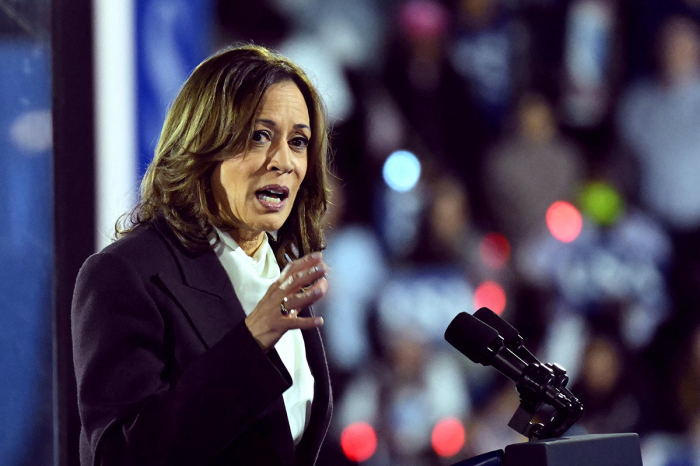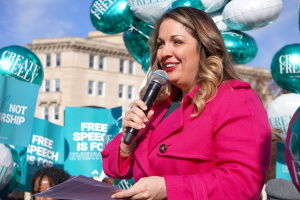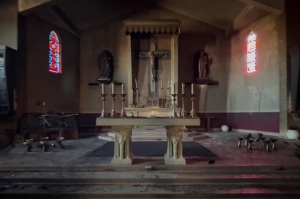'Catholics for Harris' co-founder urges Democrats to address their 'God problem'

A Catholic political operative with ties to Vice President Kamala Harris’ unsuccessful 2024 presidential election campaign is urging the Democratic Party to address its “God Problem,” which he views as one of the main reasons behind its loss.
Christopher Hale, co-founder of the group Catholics for Harris, wrote an op-ed for Newsweek titled “Kamala Harris Lost Catholic Voters Because She Didn’t Try to Win Them.” The op-ed’s publication comes after Harris lost to President-elect Donald Trump.
Exit polling of the election shows that 58% of Catholic voters backed Trump, while 40% supported Harris. This represented a dramatic turnaround from 2020, when 52% of Catholic voters supported Democratic candidate Joe Biden and 47% backed Trump.
Hale attributed Harris’ lackluster performance with the religious demographic to actions taken by her campaign and the Democratic Party as a whole. He also lamented her decision to skip the Al Smith Dinner, a charity event put on by the Roman Catholic Archdiocese of New York in the weeks leading up to the election. Normally, both the Republican and Democratic nominees attend the event and lightheartedly poke fun at one another.
While Harris didn't attend the event in person, she delivered a pre-recorded video message. Hale derided the video as ineffective: “It felt like it was put together by media operatives who believed their Catholic grade-school education gave them the insight needed to grasp the particular instincts of Catholic voters across the nation.”
Hale wrote that Harris’ decision to skip the Al Smith Dinner “underscored the Democratic Party’s growing ‘God problem,’” which he described as “symptomatic of a broader issue within the Democratic Party: a discomfort with engaging faith communities across the nation.”
“Over the years, the party has increasingly aligned itself with secular and progressive values, often sidelining religious voices in the process,” Hale wrote.
“This shift has alienated many religious voters, who feel their beliefs are not only unrepresented but actively dismissed. For Catholics, this alienation is particularly acute on issues like abortion. While many Catholics support legal abortion in some circumstances, a significant portion believes in stricter limits or oppose it altogether.”
Referring to the Democrats’ intensified support for abortion after the United States Supreme Court determined that the U.S. Constitution does not contain a right to abortion in the 2022 Dobbs v. Jackson decision, Hale said the Democrats' “unwavering commitment to reproductive choice post-Dobbs is to be expected, but its unwillingness to engage with voters who disagree is political malpractice.”
“This inflexibility makes it difficult for pro-life or moderately pro-choice Catholics to feel at home within the party, despite aligning with its positions on other critical issues like poverty, health care and immigration,” he added.
“The Democrats’ inability to engage religious voters comes with a steep political cost. Catholics are a diverse group, including both conservative and progressive voices. They are often key swing voters in battleground states like Pennsylvania, Michigan, and Wisconsin.”
Hale suggested that the party should embrace “a more inclusive approach that acknowledges the importance of faith in the lives of millions of Americans.”
“Future candidates must be willing to engage with religious voters, even on contentious issues, and find common ground where possible,” he insisted. Hale cited “targeted outreach to faith voters” and participation in the Al Smith Dinner as actions that “would demonstrate a genuine commitment to dialogue and bridge-building, signaling that the party values the contributions and concerns of religious communities.”
Hale contended that Democrats’ reluctance to engage with Catholic voters left a vacuum that Republicans all too happily filled.
“Trump’s campaign portrayed the Republican Party as the defender of religious freedom and traditional values, drawing in Catholic voters who felt overlooked by the Democrats,” he asserted.
Hale contrasted the approach of Biden in 2020 and Trump in 2024, both of whom ran ads targeting Catholic voters, with what he characterized as the Harris campaign’s “noticeable aversion to engaging with Catholic voters.”
He concluded by rejecting the belief that Democrats shouldn't engage with Catholic Church leadership because of “the sex abuse scandal, the Church’s opposition to abortion and gay marriage, and the hierarchy’s tendency to cozy up with the GOP.”
“Forty million persuadable voters shouldn’t be ignored and punished for the behavior, beliefs, and sins of their leaders,” Hale said.
Hale’s op-ed also touched upon the “damaging media narrative that Kamala Harris and the Democrats were anti-Catholic,” which he contended that Harris’ failure to attend the Al Smith Dinner fed into.
Although Biden is a practicing Catholic, his administration has faced allegations of anti-Catholicism, most notably last year after the FBI’s Richmond field office circulated a document warning of a threat posed by “radical-traditionalist Catholic ideology.”
The memo defined “radical-traditionalist Catholic ideology” as “typically characterized by the rejection of the Second Vatican Council (Vatican II) as a valid church council; disdain for most of the popes elected since Vatican II, particularly Pope Francis and Pope John Paul II; and frequent adherence to anti-Semitic, anti-immigrant, anti-LGBT, and white supremacist ideology.”
While it attempted to clarify that “radical-traditionalist Catholics compose a small minority of overall Roman Catholic adherents and are separate and distinct from ‘traditionalist Catholics’ who prefer the Traditional Latin Mass and pre-Vatican II teachings and traditions,” the apparent targeting of a religious demographic did not sit well with members of Congress and Catholic advocacy groups.
Ryan Foley is a reporter for The Christian Post. He can be reached at: ryan.foley@christianpost.com




























